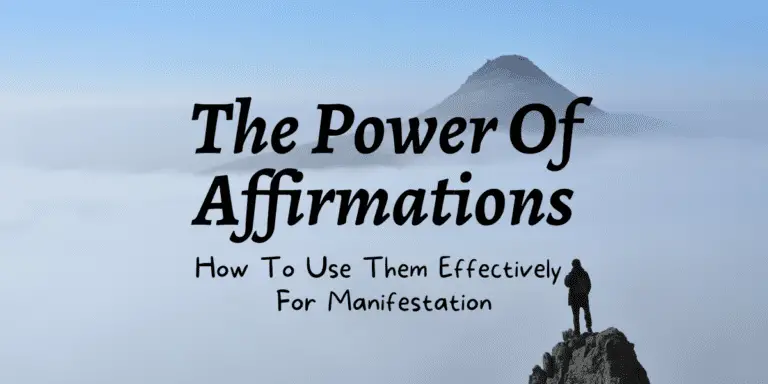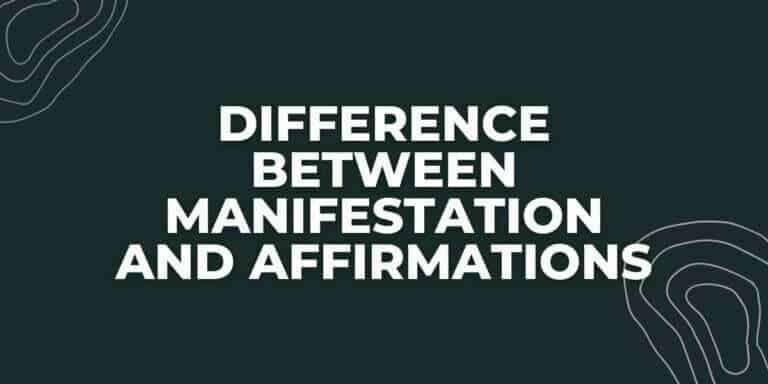Affirmations for Self-Forgiveness | From Self-Blame to Self-Love
Affirmations for Self-forgiveness are a powerful tool that can help us move past the mistakes and regrets of the past, and live a more peaceful and fulfilling life. At the same time, it can be one of the most difficult things to achieve.

We often hold ourselves to impossibly high standards, and when we fall short, we can become consumed by feelings of guilt and shame. However, affirmations are a simple yet effective way to help us on our path to self-forgiveness.
Affirmations are positive statements that can help to change our negative thoughts and beliefs into positive ones. When we repeat them to ourselves regularly, they can help to rewire our brains and improve our mindset. They can also help us to focus on what we want to achieve, instead of dwelling on past mistakes.
In this post, we’ll take a look at the importance of self-forgiveness and how affirmations can help us to achieve it. We’ll explore the benefits of self-forgiveness for our mental and physical health, and examine some common obstacles that can make it difficult to forgive ourselves. We’ll also provide some examples of self-forgiveness affirmations that you can use to start on your own journey toward inner peace.
What is self-forgiveness?
Self-forgiveness is the process of letting go of negative feelings towards yourself for past mistakes or actions. It involves acknowledging and accepting your actions, rather than dwelling on them and criticizing yourself. This can lead to a greater sense of peace, self-acceptance, and overall well-being. It’s not an easy process, but it’s an essential one in order to move forward.
There are several benefits to self-forgiveness. For example, self-forgiveness has been linked to better mental health and emotional well-being, as well as lower levels of stress, anxiety, and depression. It can also be beneficial for physical health, as chronic stress and feelings of guilt can take a toll on the body.
However, self-forgiveness can be a difficult thing to achieve. Some common obstacles include feelings of guilt, shame, and self-blame. These negative emotions can be incredibly powerful and can make it difficult to let go of past mistakes. They can also lead to a cycle of negative thinking and self-criticism.
This is where affirmations come in. By using positive affirmations, we can change our negative thoughts and beliefs about ourselves into more positive ones. Affirmations can help to counteract feelings of guilt and shame and allow us to focus on self-compassion and self-love.
It is important to note that self-forgiveness doesn’t mean forgetfulness or excusing hurtful actions towards others, it’s more of a letting go of self-blame and self-criticism, and accepting the past without dwelling in it.
How affirmations can help with self-forgiveness
Affirmations are simple yet powerful tools that can help us to achieve self-forgiveness. They work by changing the way we think and feel about ourselves and our past mistakes. When we repeat affirmations to ourselves regularly, they can help to rewire our brains and improve our mindset. They can also help us to focus on what we want to achieve, instead of dwelling on past mistakes.
There are several ways that affirmations can help with self-forgiveness. For example:
- Affirmations can help to counteract feelings of guilt and shame. When we repeat affirmations that focus on self-compassion and self-love, we can begin to let go of these negative emotions and focus on positive ones instead.
- Affirmations can help to improve our self-esteem. When we repeat affirmations that focus on our worthiness and value, we can begin to see ourselves in a more positive light and feel more confident in our abilities.
- Affirmations can help us to develop a more positive inner dialogue. By repeating affirmations that focus on self-forgiveness, we can begin to change the way we talk to ourselves, and develop a more compassionate and understanding inner voice.
Creating your own affirmations is easy, you can use prompts like “I forgive myself for ….” or “I am worthy of forgiveness for ….”, or use phrases like “let go” or “move on” to help you let go of the past and focus on the present and future.
It’s also important to note that affirmations should be repeated regularly, and it’s best to do so in the morning and evening when the mind is more open to receiving new information. And, it is recommended to use affirmations in combination with other self-care practices such as meditation and journaling.
Examples of Affirmations for Self-Forgiveness
Here are some examples of self-forgiveness affirmations that you can use to help with the process of self-forgiveness:
- “I forgive myself for my past mistakes and trust in my ability to learn and grow from them.”
- “I am worthy of forgiveness and compassion.”
- “I release the past and choose to focus on the present and future.”
- “I am strong and capable of letting go of guilt and shame.”
- “I am worthy of love and acceptance, including my own.”
- “I let go of self-doubt and trust in my own inner wisdom.”
- “I am enough exactly as I am, past mistakes included.”
It’s important to note that these affirmations are not a magic solution, but rather a way to start shifting your thoughts toward self-forgiveness and self-compassion. You can use these affirmations as they are, or personalize them to make them more meaningful to you.
For example, instead of “I forgive myself for my past mistakes” you can say “I forgive myself for not speaking up when I should have” or “I forgive myself for not taking care of myself” etc. Repeat the affirmation that resonates with you the most, and as you start to incorporate them into your daily routine you’ll start to notice changes in your mindset.
Finally, remember that self-forgiveness is a process and not an event, it takes time and consistency, so be kind and patient with yourself.
Affirmations for the forgiveness of others
Forgiveness is an important part of life and can be difficult to practice. Affirmations are a great way to help yourself remember the importance of forgiveness and cultivate a forgiving attitude. Some affirmations for the forgiveness of others include:
- “I forgive those who have wronged me, and I release any anger or resentment I may be holding onto.”
- “I am open to understanding the perspective of others, and I choose to forgive them for their mistakes.”
- “I am compassionate towards myself and others, and I practice unconditional forgiveness in my life.”
Repeating these affirmations regularly can help you establish a more positive outlook on life and cultivate an attitude of compassion and understanding towards those who have wronged you.
Affirmations for forgiveness and release
Affirmations can be a powerful tool to help us forgive and release. Here are some affirmations you can use to help with forgiveness and release:
- “I choose to forgive myself and others for past mistakes.”
- “I accept that I cannot change the past, but I can create a better future.”
- “I forgive myself and others for any hurt caused by our actions.”
- “I am free from any burden of guilt or regret.”
- “I am open to new possibilities and experiences.”
- “I have the strength to let go of the past and move forward with grace and courage.”
- “My heart is full of love, compassion, and understanding for myself and others.”
- “I am grateful for all that I have learned from my experiences.
Conclusion
Self-forgiveness is an essential step in living a more peaceful and fulfilling life. By letting go of negative feelings towards ourselves for past mistakes, we can improve our mental and physical health and find inner peace. However, it can be a difficult process, especially when we’re held back by feelings of guilt and shame.
Affirmations are a simple yet powerful tool that can help us to achieve self-forgiveness. By repeating positive statements about ourselves, we can change our negative thoughts and beliefs about ourselves and our past mistakes into positive ones. Affirmations can help to counteract feelings of guilt and shame and allow us to focus on self-compassion and self-love.
In this post, we’ve provided some examples of self-forgiveness affirmations that you can use to start on your own journey toward inner peace. Remember that affirmations should be repeated regularly, ideally in the morning and evening, and in combination with other self-care practices like meditation and journaling.
Remember that self-forgiveness takes time, it’s not a one-time event. It’s important to be kind and patient with yourself and to remember that every day is an opportunity to start again. Keep in mind that you are not alone and that there are many resources and communities that can help you on your journey.






